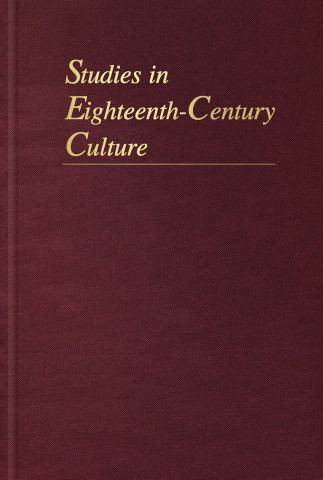
Book Details
Liberal Theory and Eighteenth-Century Criticism, by David Rosen and Aaron Santesso
Novel Paintings: Learning to Read Art Through Joseph Highmore's Adventures of Pamela, by Aaron Gabriel Montalvo
"A
Liberal Theory and Eighteenth-Century Criticism, by David Rosen and Aaron Santesso
Novel Paintings: Learning to Read Art Through Joseph Highmore's Adventures of Pamela, by Aaron Gabriel Montalvo
"A tedious accumulation of nothing": Christopher Smart, Imperialist Archives, and Mechanical Poetry in the Eighteenth Century, by Jesslyn Whittell
Robert Burns and the Refashioning of Scottish Identity through Songs, by Stacey Jocoy
Animal Domestication and Human-Animal Difference in Buffon's Natural History, by Dario Galvo
Marvelous Maples: Visions of Maple Sugar in New France, 1691-1761, by Nathan D. Brown
Pirate Vices, Public Benefits: The Social Ethics of Piracy in the 1720s, by Noel Chevalier
Defoe's "Mobbish" Utopias, by Maximillian E. Novak
Fragile Communities in the Crusoe Trilogy, by Li Qi Peh
Family Instruction in Defoe's Further Adventures: Consider the Children, by Judith Stuchiner
Friendship, Not Freedom: Dependent Friends in the Late Eighteenth-Century Novel, by Renee Bryzik
The Art of Intercultural Engagement: A Cluster on Daniel O'Quinn's Engaging the Ottoman Empire: Vexed Mediations, 1690-1815
Introduction: Daniel O'Quinn's Melancholy Cosmopolitanism, by Ashley L. Cohen
The Archive and the Repertoire of the Treaty of Karlowitz, by Angelina del Balzo
Empire and Modern Media: Vanmour or less, by Douglas Fordham
Wrinkles in Imperial Time, by Lynn Festa
Between Geographic and Conceptual Fields: Mapping Microhistories in the Eighteenth-Century Ottoman Empire, by Katherine Calvin
Rabble, Rubble, Repeat, by Zirwat Chowdhury
On Walls, Bridges, and Temporal Folds: Epic, Empire, and Neoclassicism Revisited, by Charlotte Sussman
What Eludes Us, by Daniel O'Quinn






